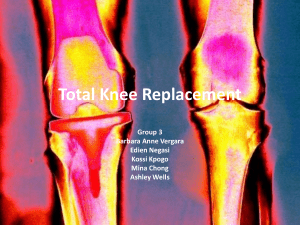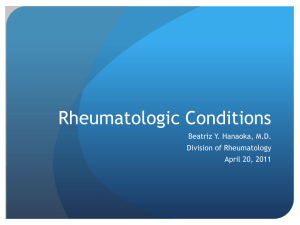Issue Brief - Arthritis Foundation
advertisement
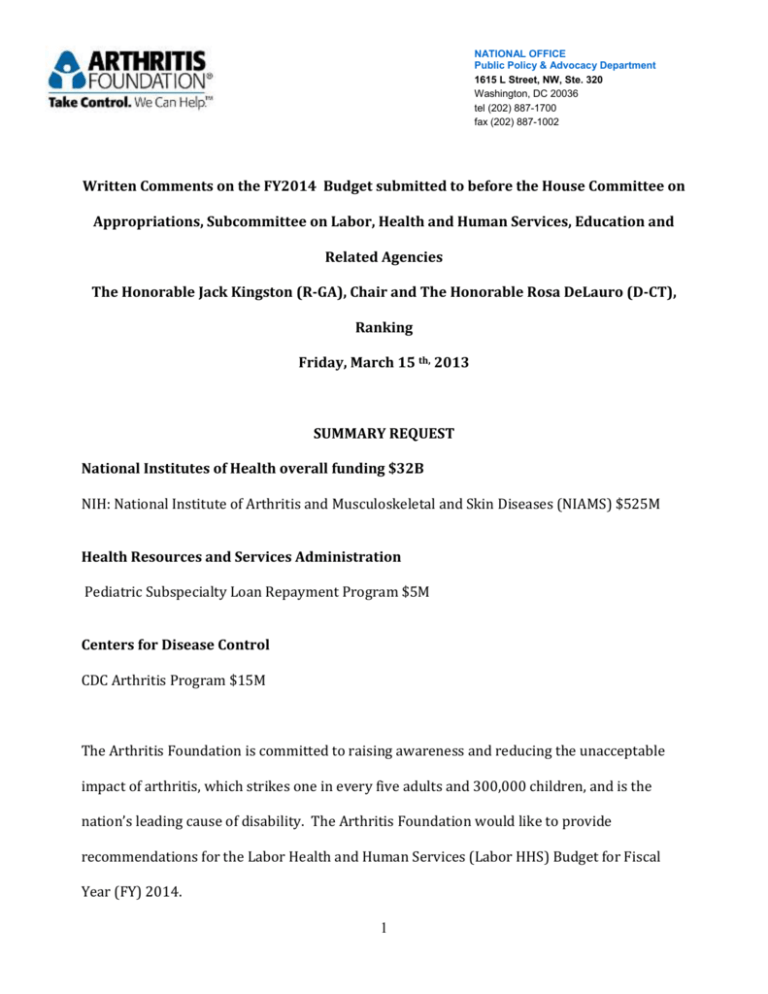
NATIONAL OFFICE Public Policy & Advocacy Department 1615 L Street, NW, Ste. 320 Washington, DC 20036 tel (202) 887-1700 fax (202) 887-1002 Written Comments on the FY2014 Budget submitted to before the House Committee on Appropriations, Subcommittee on Labor, Health and Human Services, Education and Related Agencies The Honorable Jack Kingston (R-GA), Chair and The Honorable Rosa DeLauro (D-CT), Ranking Friday, March 15 th, 2013 SUMMARY REQUEST National Institutes of Health overall funding $32B NIH: National Institute of Arthritis and Musculoskeletal and Skin Diseases (NIAMS) $525M Health Resources and Services Administration Pediatric Subspecialty Loan Repayment Program $5M Centers for Disease Control CDC Arthritis Program $15M The Arthritis Foundation is committed to raising awareness and reducing the unacceptable impact of arthritis, which strikes one in every five adults and 300,000 children, and is the nation’s leading cause of disability. The Arthritis Foundation would like to provide recommendations for the Labor Health and Human Services (Labor HHS) Budget for Fiscal Year (FY) 2014. 1 Specifically, we would like to comment on three specific agencies of jurisdiction of the Labor HHS Appropriations Subcommittee: the National Institutes of Health (NIH) and in particular the National Institute of Arthritis and Musculoskeletal and Skin Diseases (NIAMS), the Health Services Resources Administration (HRSA) and the Centers for Disease Control (CDC). ARTHRITIS RELATED RESEARCH INVESTMENTS AT THE NATIONAL INSTITUTES OF HEALTH (NIH): FUNDING FOR THE NATIONAL INSTTUTE OF ARTHRITIS AND MUSCULOSKELETAL AND SKIN DISEASES (NIAMS) Research holds the key to preventing, controlling, and curing arthritis, the nation’s leading cause of disability. The prevalence, impact and disabling pain continues to increase. 50 million Americans—one in five adults—have arthritis now. Within 20 years, the Centers for Disease Control and Prevention (CDC) estimates that 67 million adults or 25% of the population will have arthritis. Arthritis limits the daily activities of 21 million Americans and accounts for $128 billion annually in economic costs. The National Institute of Arthritis and Musculoskeletal and Skin Diseases (NIAMS) supports research into the causes, treatment, and prevention of arthritis and musculoskeletal and skin diseases. The critical research done at NIAMS improves the quality of life for people with arthritis and decreases the overall burden of the disease. NIH funding should be allocated $32B for FY 2014 and NIAMS should be funded at $559M to fund critical research on arthritis and other related diseases at the Institute. Our NIH recommendations reflect , the minimum needed to sustain the current level of research and account for inflation. 2 HRSA PEDIATRIC SUBSPECIALITY LOAN REPAYMENT PROGRAM Juvenile arthritis is one of the most common childhood diseases, affecting more children than cystic fibrosis and muscular dystrophy. Currently, there are less than 250 board-certified practicing pediatric rheumatologists in the United States and about 90 percent of those are clustered in and around large cities. Pediatric rheumatology has one of the smallest numbers of doctors of any pediatric subspecialty. Of those children with juvenile arthritis, only onefourth see a pediatric rheumatologist due to their scarcity. The other 75% of juvenile arthritis patients see either pediatricians (who tend not to be trained in how to care for juvenile arthritis) or adult rheumatologists, who aren't trained to deal with pediatric issues. Issues such as whether it’s the stunted bone growth that can result from arthritis and its treatment, or the unwillingness of an adolescent to take his medicine. There are currently eleven states that do not have a single practicing pediatric rheumatologist and seven states with only one pediatric rheumatologist. The Pediatric Subspecialty Loan Repayment Program was authorized by Section 5203 of the Affordable Care Act (ACA) in March 2010. The program would incentivize training and practice in pediatric medical subspecialties, like pediatric rheumatology, in underserved areas across the United States. The program would offer up to $35,000 in loan forgiveness for each year of service for a maximum of three years. The program was authorized for $30 million for FY 2010 through FY 2014, but has yet to be appropriated any funding. The Arthritis Foundation urges Congress to allocate $5 million dollars to fund the Pediatric Subspecialty Loan Repayment Program. 3 CENTER FOR DISEASE CONTROL: CDC ARTHRITS PROGRAM The goal of the CDC Arthritis Program is to improve the quality of life for people affected by arthritis and other rheumatic conditions by working with states and other partners to (1) increase awareness about appropriate arthritis self-management activities, (2) expanding the reach of programs proven to improve the quality of life for people with arthritis and (3) decrease the overall burden of arthritis as well as its associated disability, work and activity limitations. The Arthritis Foundation requests that Congress provide a slight increase ($2M) to expand the CDC Arthritis Program to $15M for FY 2014. These additional funds would allow the Program to expand to two additional states. These state-based programs would (1) increase evidence based interventions, such as the Arthritis Foundation’s Walk with Ease Program (WWE), into more communities; (2) reach diverse populations by funding partnership activities; and (3) support the OA Action Alliance, a coalition committed to elevating OA as a national priority. www.oaactionalliance.org. The Arthritis Foundation appreciates the opportunity to provide recommendations to the House Labor Health and Human Services Committee on recommendations for FY2014. If you have questions about these comments, please don’t hesitate to contact the Arthritis Foundation. Questions about HRSA requests—Kim Beer, Director, Government Relations, kbeer@arthritis.org/202.887.2918 or Maria Spencer, Director, Federal Affairs for NIH/CDC, mspencer@arthritis.org/202.887.2912 4
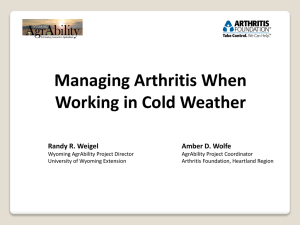
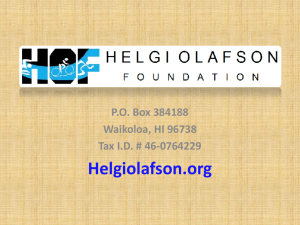
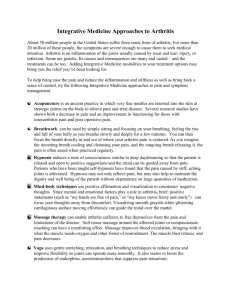
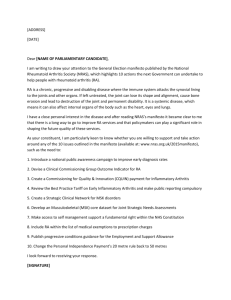
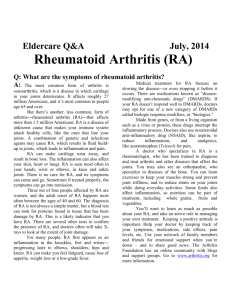
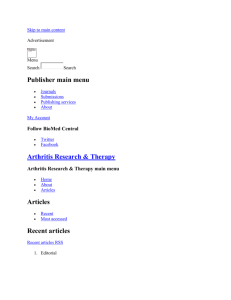
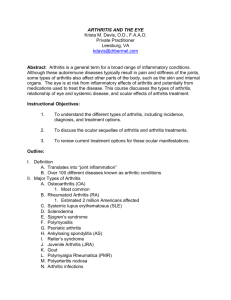
![Drew Smith Lyprinex From Lifeplus is Lyp[...]](http://s3.studylib.net/store/data/006626625_1-79666c56f35487bdcc1f0e10451df3b3-300x300.png)
